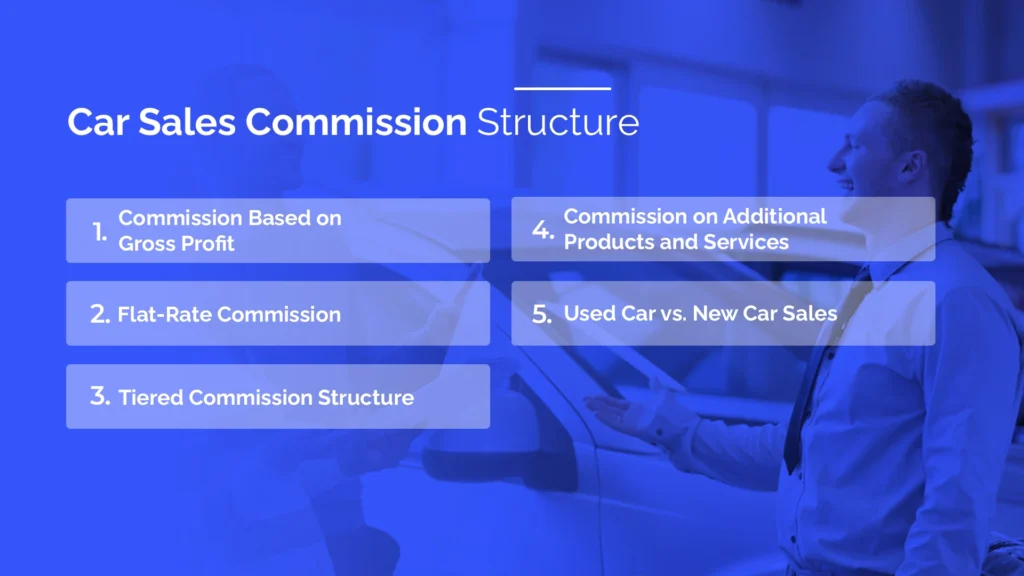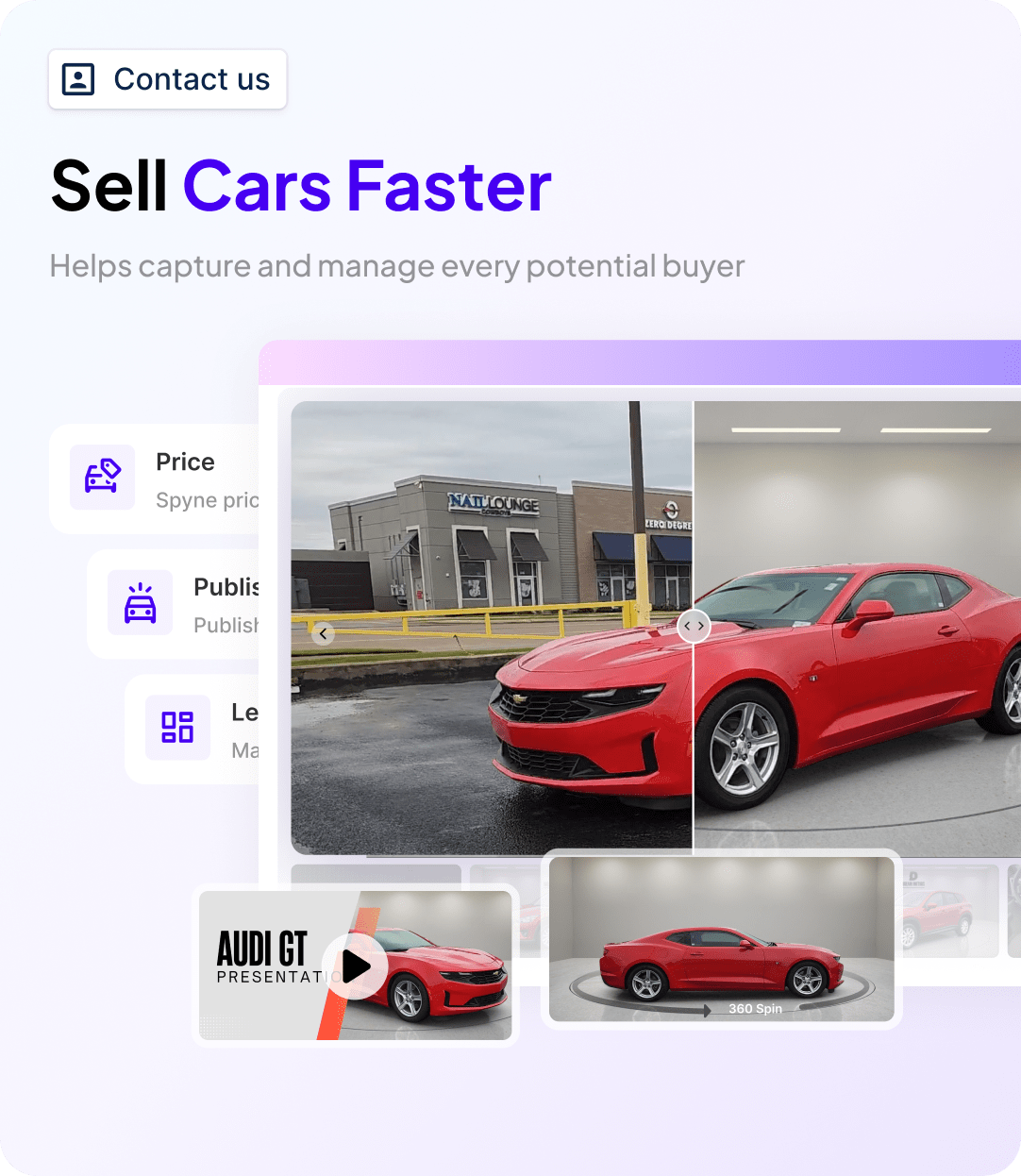What is more satisfying than a pat on the back after the completion of a deal? If the appreciation is monetary, then it definitely sounds like icing on the cake. That’s precisely what the car sales commission is! It is the supplementary remuneration that an automotive sales associate accrues upon the successful deal of a vehicle.
What is Car Sales Commission?
Car sales commission is a percentage of the selling price of the closed deal, which is paid to the salesperson as an incentive for their good persuasion skills. Better car dealership marketing strategies, along with a salesperson’s skills, directly impact sales. More the sales, more is the profit.
How does commission work in car sales? Typical commission for car sales may vary between 30-40% of the profit. The paid commission depends on various other factors like the type of vehicle sold, the incentive policy of the dealership, the experience and tenure of the salesperson, and whether the commission is paid on the total sale price or only the profit.
How Do Car Salesmen Make Money?
There can be two primary sources of income for salesmen in car dealerships: commission and fixed salary. Both of these plans have their pros and cons, which will be discussed later in the article. We know that car salesmen have a basic salary, which they get irrespective of their monthly performance.
Apart from that, they get a variable amount after the successful completion of every sale, which is called car sales commission. This entirely depends on the salesman’s expertise, car sales pitch, and ability to take the customer from the consideration phase to the lead maturation stage. Innovative car salesman marketing ideas, along with good communication skills of the salesperson, often lead to more successful deals.
Car Sales Confidential: How Much Can You Actually Make Through Commission?
This is a very subjective question. The calculation of the commission on a new/used car depends on the following factors: –
- Depending on the dealership, the salesman’s average commission on car sales is generally up to 25% of the commission on front-end profit for every car they sell.
- Besides the skills of a salesman, the dealership company that one works for determines the overall commission, too.
- Location is another factor that comes into play while determining commission.
- The gross front-end amount of the closed deal is also a significant determinant of how much a sales representative gets out of the agreement because the commission is a percentage of the same.
- Salespeople often receive commission on additional products sold with the vehicle, such as extended warranties, service packages, or accessories. This can be a major add-on for a single sale. So, it makes the salesman earn more from a single deal.
However, if asked to quote a rough amount, then an average salesperson (someone who sells around eight cars a month) can get a typical car sales commission between $3,000 and $4,000 a month.
Car Sales Commissions Calculator
Before we proceed to the calculations part, one must know the following terminologies:
Sale price: The price at which the customer buys an automobile.
Dealership price:
- For a used car, the dealership price is the price at which the vehicle is bought, repaired, and maintained. Usually, if the vehicle’s condition is good, then the dealership price goes down because of reduced touch-up costs.
- For a new car, it is the invoice price, i.e., the price at which the dealership buys a new car.
Gross profit: Sale price- dealership price
Ex.- Car sales commission calculator
Sale Price: $30,000
Dealership’s Cost: $26,000
Gross Profit: $30,000 – $26,000 = $4,000
Salesperson’s Commission: If the salesperson’s commission is 20% to 30% of the gross profit:
- 20% of $4,000 = $800
- 30% of $4,000 = $1,200
Dependencies:
- Manufacturers may offer incentives or bonuses for selling specific new models or for reaching sales goals.
- Commissions on additional products like extended warranties, financing, or accessories can also contribute to the salesperson’s earnings.
- In used car dealerships, rarely used or well-maintained cars reduce dealership costs, increasing gross profit and the salesperson’s commission.
Car Sales Remuneration: Commission vs. Fixed Salary
Car salespeople have two primary income sources: commission-based and fixed salary. Commission-based plans offer the potential for high earnings based on sales performance. Though inherently erratic, these commissions can yield considerable financial rewards when sales targets are successfully achieved.
Fixed salary plans provide stability but have a cap on how much money you can make.
| Fixed salary | Commission |
| It is a fixed amount paid by the dealership to the salesperson every month as a part of employment. | It is a bonus that is paid to the salesperson on every successful completion of a deal. |
| Fixed salary has an upper cap. As the name suggests, a fixed remuneration is provided monthly. | Car sales commission has no limits. The bonus increases as the number of successful sales goes up. |
| It serves as a reliable and consistent source of income, guaranteeing a steady and uninterrupted stream of financial resources. | It is unstable because the maturation of deals can vary based on many factors. |
| Fixed salary is decided at the time of employment. | The percentage is fixed. However, the commission amount totally depends on the gross profit earned from that deal. |
| Depends on the salesperson’s experience, the dealership, ongoing rates, etc. | Depends on market conditions, car sales pitch, the car models, individual buyer choices, etc. |
| Example: A salesperson’s salary is approximately 40,000 to 50,000 $ per year. | Example: Average commission on car sales varies from 20 to 30 percent of the gross profit on every deal. |
Car Sales Commission Structure
The car sales commission structure delineates the rules and layout that a car dealership follows to compensate salespeople for convincing potential buyers after the completion of a deal. The structure varies depending on the dealership, the type of car sold (new or used), and the overall sales market. The structures can vary depending on the following parameters: –
1. Commission Based on Gross Profit
It’s the most commonly used way of compensating salespeople. Usually, the sales representatives get a certain percentage of the gross profit, which can be anything from 20 to 30 percent. The final amount stays variable in this case because the gross profit is not fixed.
2. Flat-Rate Commission
As the name suggests, some dealerships offer a fixed amount to their salespeople after the successful completion of every deal, irrespective of the gross profit. This makes this type of income more predictable.
For example, the salesperson might earn a flat fee of $300 to $500 per car, regardless of whether the vehicle is sold for $20,000 or $40,000.

3. Tiered Commission Structure
In this structure type, the bulk is targeted. After reaching a specific sales target, the commission percentage on car sales increases.
Example:
The first 10 cars sold in a month, the salesperson earns 20% of the gross profit.
For cars 11 through 20, the commission rate increases to 25%.
Cars sold beyond 20, the commission rate might increase further to 30%.
4. Commission on Additional Products and Services
Salespeople often earn commission on add-ons or extra services sold with the car, such as:
- Extended warranties
- Service packages
- Financing deals
- Car accessories (e.g., floor mats, upgraded sound systems)
5. Used Car vs. New Car Sales
Some car dealers impose commission caps, limiting the maximum amount a salesperson can earn per sale or month. This is profitable for the dealership but adds constraints to the salesperson’s earnings.
Conversely, there may also be commission floors, where the salesperson earns at least a minimum amount per car sold, regardless of the deal terms. This ensures that the salesperson always gets a decent amount for his convincing skills, irrespective of the gross profit.
Spyne: Your Catalyst for Exponentially Enhancing Car Sales Commissions
Although earning a commission is predominantly contingent upon a salesperson’s adeptness in persuading potential buyers and perpetually honing their communication prowess—skills that can be refined through specialized auto sales training—Spyne, in this regard, can prove to be an invaluable asset.
1. Websites That Generate More Leads
A good automotive website attracts more traffic, increasing the automobile’s outreach to potential customers. The more leads the website generates, the more chances there are of a successful deal.
- With Spyne’s automotive website builder, you can create websites that impact and engage customers.
- Even when you don’t know where to begin, Spyne’s ready-to-use automotive website templates help you start and make a website from scratch to finish in the blink of an eye.
- Our built-in AI provides refined texts for the website pages like (blog pages, Vehicle display pages, and payment pages) making them informative too.
In addition to better car dealership marketing, this significantly increases the chances of a successful purchase, which in turn increases the chances of getting a commission on the salesperson’s end because the more successful sales, the more the commission.
2. Boost Sales and Commissions with Spyne’s CRM Tool
Spyne’s powerful upcoming automotive CRM (customer relationship management) software will help you follow up in a way that makes the customer feel familiar with the dealership. This will make them feel more connected to the salesperson and the dealership, fostering better relationships and increasing the likelihood of closing deals. The more deals are closed, the better the average car sales commission value.
Spyne’s website builder and upcoming CRM tool will help boost the demand for the product. Our visual magic tools make the product look more exclusive and worthy of a better sale price. A better sale price leads to a more significant gross profit, ultimately increasing the commission value. Wondering how to sell car on Facebook marketplace or any marketplace for that matter? Spyne’s AI-improved images can be exported to any platform, enhancing their appeal to potential buyers.
Conclusion
Car sales commission is an incentive paid to salespeople based on the successful sale of a vehicle. Salesmen usually have a basic salary, with commission acting as a variable income based on their sales performance. The car sales commission structure varies depending on dealership policies. Overall, this system rewards salespeople for their skills and ability to close deals, with more sales translating to higher commissions.
Spyne’s tools, like its automotive website builder and customer relationship management system, can help car salespeople generate more leads and foster customer relationships, ultimately increasing the chances of closing deals and earning higher commissions.














